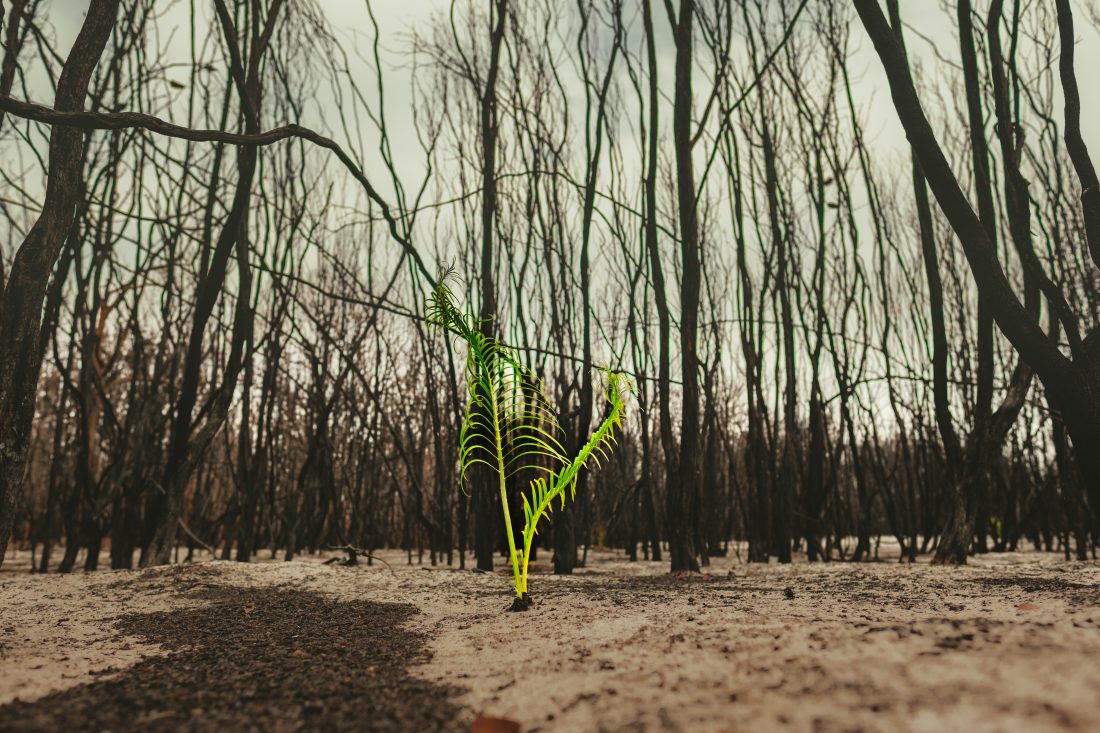
Wake Up
I didn’t know whether to laugh, cry, or simply to be angry. I’d just sent out an e-message to the Wild community; in it, I’d asked readers to spare a thought for our fire-ravaged communities, and to urge our leaders to act on climate change. Soon after, I received an email in response. It was from JH. But JH didn’t want to spare a thought for those in fire-ravaged communities, or to express sorrow for the loss of wild places, or to express dismay that rainforests that haven’t seen fire in not just hundreds or thousands but millions of years have been torched. No, JH’s email, in its entirety, was this: These bushfires are not linked to climate change. Wake up.
Wake up.
At the time I read the email, I was in the US, visiting my wife’s family. I couldn’t help but think back to being with them when Sandy Hook occurred, when a gunman entered a US school and killed 20 kids and six adults. At the time, my wife’s family was, of course, shocked, but they also believed this horrific event would now, at last, spur Congress to act on gun control. This, they said, was a wake up. Things would change. Surely. They had to.
As we all know, they didn’t. Now, I’m going to admit I was no great fan of John Howard. I don’t really need to get into the reasons for that here. But one thing I will forever admire Howard for was his stance on guns in the wake of the Port Arthur Massacre. He was, in short, a leader. Confronted with a crisis, he woke up. And he acted.
Australia has—over this recent fire season—been confronted by a crisis far bigger than that of Port Arthur, as terrible as that was. There have been 34 fatalities, a billion-plus animal deaths, and many millions of hectares of woodland burnt. “The scale of these fires,” says Professor John Shine, “is unprecedented anywhere in the world.” And the question now is, what will our leaders do? Nothing, as in the US after Sandy Hook? Or act, as Howard did after Port Arthur?
Wake up.
Frankly, who knows which way things will go. It seems patently obvious that this, at last, should force action from the top on climate change, because—sorry, JH— the facts are in (see the links between cli- mate change and the fires in this issue’s story Charred Country, starting p40). The problem is, however, we live in an age that, for many people, facts don’t matter. Science? Experts? Paah! What would they know? Sadly, too many of our politicians have shamelessly exploited this, using climate change as a cheap political wedge issue. But this needn’t be an affair of left vs right: If the UK’s Boris Johnson, no bleeding-heart leftie, can commit to carbon neutrality by 2050, then any side of politics can. (Although 2040, or earlier preferably, would be a far better target.)
Wake up.
Wake up, because change is coming, like it or not. Renewable energy is close to the price of electricity produced via burning fossil fuels; it’s not far off being cheaper, if it’s not already. And within a few decades the rest of the world won’t want our dirty coal anyway. Mining jobs will be lost regardless. Notice I said ‘mining jobs’ and not ‘jobs’. Germany notably closed every single black coal mine without a single job loss, and aims to phase out the entire coal sector. Australia, pathetically, is planning new mines.
Coal, of course, isn’t the only source of carbon. Nor are fossil fuels. A major repository of carbon is soil; simply ploughing it releases huge amounts of carbon. Cement production, surprisingly, is another huge emitter, contributing 8% globally. And CO2 isn’t the only greenhouse gas causing climate change. Methane is far more potent.
But back to facts. The prime reason why, in this case, they don’t work is that potential job losses—even if short term— arouse passions so great that facts get cast aside. It’s not minuscule power price increases (an argument soon to be rendered moot by renewable energy’s plunging costs) that inflame rhetoric; it’s jobs. If we want action taken to save our forests, our wildlife, our communities, we must tell our leaders to take the jobs argument out of the debate. Lead. Act. Come up with a plan for a complete transition from all fossil fuels that won’t leave people jobless. And we, in turn, must be prepared to pay for that plan. The Germans, for instance, are spending $68 billion for their orderly transition from coal. And we need to each play our part, too. We need to reduce our ecological footprints. To consume less. And to make wiser choices.
Our country needs to wake up. Wake up.
James McCormack
Editor
Photo credit: Martin von Stoll

